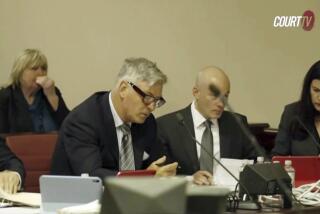Simpson Judge Says Who Goes, Who Stays
- Share via
A man convinced that DNA tests are foolproof is deemed too biased to sit as a juror in the O.J. Simpson civil case. But a man who believes Simpson was the target of a police rush to judgment remains on the panel.
A woman who thinks spousal abuse logically leads to murder--and who brands Simpson as a wife-beater--gets to stay on the case. But a woman who contends that police broke some rules while investigating Simpson earns a prompt recusal.
Who’s on and who’s off? Who’s impartial and who’s not? Who is biased and who is merely opinionated?
As jury selection grinds on in the Simpson civil case, it’s been up to Superior Court Judge Hiroshi Fujisaki to make those calls.
With nearly every potential juror expressing some views about the case, Fujisaki must decide which candidates will be able to put aside their impressions and judge the case solely on the evidence presented during the trial. It’s a tedious, taxing process--and the results can be bewildering.
“Just having an opinion on the criminal case is clearly not sufficient for bias,” said Loyola Law School Dean Laurie Levenson, who has sat in on several recent court sessions. “I think it’s somewhat unpredictable who [Fujisaki] accepts” and who gets bumped off the panel. “That has to be frustrating for the lawyers.”
Fujisaki’s brusque style gives lawyers no chance to complain when he ousts a juror. Quickly and decisively, he bumps them--and that’s that. The judge has made it clear he’s interested in one question above all: whether candidates can promise under oath that they will treat the civil trial as a brand-new case, to be evaluated with fresh eyes and an open mind.
Thus, he ruled Wednesday that a white woman who called Simpson a wife-beater four times in a brief questionnaire could remain on the panel, because she indicated she did not have a firm opinion about whether Simpson was responsible for the June 12, 1994, murders of Nicole Brown Simpson and Ronald Lyle Goldman. He also retained a black woman who was suspicious about the way police handled O.J. Simpson’s blood, as she, too, pledged she could judge the case fairly.
But he instantly excused a white man who said he thought Simpson was “definitely guilty.” A white woman who said she “honestly did not know” whether she could set aside her strong belief in Simpson’s guilt was also dismissed.
So, too, was a black woman who called Simpson’s conduct during the criminal trial “excellent” and indicated that murder charges against him “should have been thrown out” for lack of evidence.
Strong negative feelings about the Brown and Goldman families tend to trigger a speedy dismissal. Yet Fujisaki has allowed candidates to stay in the jury pool even if they express disgust about key witnesses in the case.
A man who said he considered all expert witnesses “whores” was retained, for example, as was a woman who described former LAPD Det. Mark Fuhrman as a “cocky jerk.”
In three days of questioning jurors, Fujisaki has so far ordered about half of the 59 candidates on to the next stage of the selection process--a lengthy questionnaire probing their attitudes toward domestic violence, racism, celebrity, police and other relevant issues. In the end, he plans to seat 12 jurors and eight alternates.
As the process drags on, tempers in Fujisaki’s courtroom have started to fray.
On Friday, defense counsel Robert C. Baker accused his opponents of trying to weed out African American jurors. “This is about the 10th black juror in a row that the plaintiffs have challenged,” Baker said.
The lead plaintiffs’ lawyer, Daniel M. Petrocelli, started to object, but Fujisaki cut him off, barking: “Now cut it out. Just sit down.”
Later, Fujisaki turned on the defense team, chastising Baker for trying to lead a juror into making biased comments against Simpson. “That’s exactly what you did,” Fujisaki told Baker when he tried to protest.
More to Read
Sign up for Essential California
The most important California stories and recommendations in your inbox every morning.
You may occasionally receive promotional content from the Los Angeles Times.













